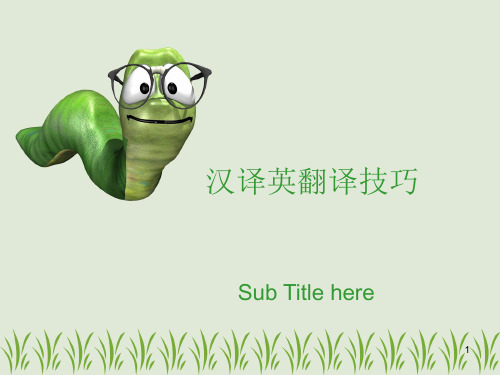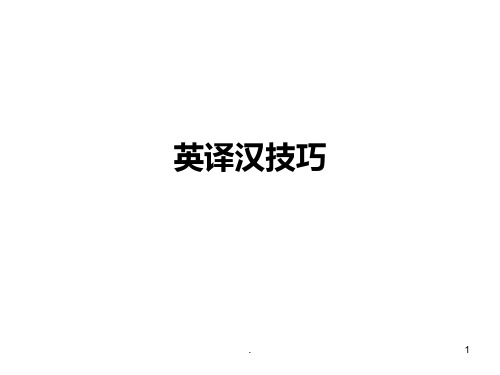汉译英翻译常用技巧一PPT课件
合集下载
汉译英翻译常用技巧(一)PPT文档共46页

Thank you
6、最大的骄傲于最大的自卑都表示心灵的最软弱无力。——斯宾诺莎 7、自知之明是最难得的知识。——西班牙 8、勇气通往天堂,怯懦通往地狱。——塞内加 9、有时候读书是一种巧妙地避开思考的方法。——赫尔普斯 10、阅读一切好书如同和过去最杰出的人谈话。——笛卡儿
汉译英翻译常用技巧(一)
1、合法而稳定的权厚善良的美 德。— —伯克
3、最大限度地行使权力总是令人反感 ;权力 不易确 定之处 始终存 在着危 险。— —塞·约翰逊 4、权力会奴化一切。——塔西佗
5、虽然权力是一头固执的熊,可是金 子可以 拉着它 的鼻子 走。— —莎士 比
6、最大的骄傲于最大的自卑都表示心灵的最软弱无力。——斯宾诺莎 7、自知之明是最难得的知识。——西班牙 8、勇气通往天堂,怯懦通往地狱。——塞内加 9、有时候读书是一种巧妙地避开思考的方法。——赫尔普斯 10、阅读一切好书如同和过去最杰出的人谈话。——笛卡儿
汉译英翻译常用技巧(一)
1、合法而稳定的权厚善良的美 德。— —伯克
3、最大限度地行使权力总是令人反感 ;权力 不易确 定之处 始终存 在着危 险。— —塞·约翰逊 4、权力会奴化一切。——塔西佗
5、虽然权力是一头固执的熊,可是金 子可以 拉着它 的鼻子 走。— —莎士 比
英汉互译八种技巧 ppt课件

❖ 4. 保留习语中的重复 ❖ Long, long ago… ❖ 很久很久以前,··· ❖ The flower is very ,very beautiful. ❖ 这花可美可美了。 5,英语强势词的译法 Whatever, whatsoever, whoever, whomever,
whichever, whenever, wherever, however.
❖ Such a trifling thing is hardly worth mentioning. ❖ 区区小事,不足挂齿。 ❖ On returning to India, and ever after, he used to
speak of the pleasure of this period of his existence with great enthusiasm. ❖ 他后来回到印度,一提起那一段逍遥自在的日子, 总是眉飞色舞。 ❖ She spoke little and then after long meditation. ❖ 她少言寡语,而且总是在深思熟虑之后才开口。
8. 留得青山在, 不怕没柴烧。 So long as green hills remain, there will never be a shortage of firewood.
3. 减译法
❖ 增译法的反面
❖ 减译法是指原文中有些词在译文中不译出来, 因为译文中虽无其词而已有其意,或者在译文 中是不言而喻的;
❖ 别把那点钱挂在心上。你什么时候有什么时 候还我好了。
❖ 6.重复副词 ❖ Nels had it all written out neatly. ❖ 纳尔斯把它写得清清楚楚。 ❖ By and by the building rose up. ❖ 楼房一点一点地升起来了。 7,使用四字词组 Come over and have a rest. 过来休息休息。
汉译英翻译技巧PPT课件

汉译英翻译技巧
Sub Title here
1
一)词的翻译
• >>1.词义选择 • (1)语境词 • 例子: • 原句:手机刷新了人与人的关系。
• 译文:Cell phone have altered the
relationship among people. • 分析:“刷新”此处实际是指“改变”,
4
一)词的翻译
• >>3.词的增补 • (1)语法需要 • (2)意思表达需要 • (3)文化背景解释的需要
• >>4.词的减省 • >>5.词的代替(用代词代替重复的部分)
5
二)句的翻译
• >> 1)确立主干 • (1)确定主语 • 例文:这个地方比较多雨。 • 译文1:It rains a lot in this area. • 译文2:This area sees much rain. • 译文3:There is much rain in this area. • 分析:汉语主语的角度变化很少,而英语则变化
12
写在最后
成功的基础在于好的学习习惯
The foundation of success lies in good habits
13
结束语
当你尽了自己的最大努力时,失败也是伟大的, 所以不要放弃,坚持就是正确的。
When You Do Your Best, Failure Is Great, So Don'T Give Up, Stick To The End 演讲人:XXXXXX 时 间:XX年XX月XX日
2)段落的连贯 段落的连贯(coherence)指的是内容情节的 串联,或者逻辑关系上的贯通,总得来说 就是有完整的语义关系。
Sub Title here
1
一)词的翻译
• >>1.词义选择 • (1)语境词 • 例子: • 原句:手机刷新了人与人的关系。
• 译文:Cell phone have altered the
relationship among people. • 分析:“刷新”此处实际是指“改变”,
4
一)词的翻译
• >>3.词的增补 • (1)语法需要 • (2)意思表达需要 • (3)文化背景解释的需要
• >>4.词的减省 • >>5.词的代替(用代词代替重复的部分)
5
二)句的翻译
• >> 1)确立主干 • (1)确定主语 • 例文:这个地方比较多雨。 • 译文1:It rains a lot in this area. • 译文2:This area sees much rain. • 译文3:There is much rain in this area. • 分析:汉语主语的角度变化很少,而英语则变化
12
写在最后
成功的基础在于好的学习习惯
The foundation of success lies in good habits
13
结束语
当你尽了自己的最大努力时,失败也是伟大的, 所以不要放弃,坚持就是正确的。
When You Do Your Best, Failure Is Great, So Don'T Give Up, Stick To The End 演讲人:XXXXXX 时 间:XX年XX月XX日
2)段落的连贯 段落的连贯(coherence)指的是内容情节的 串联,或者逻辑关系上的贯通,总得来说 就是有完整的语义关系。
英译汉翻译技巧必看PPT课件

• 他三岁丧父,所以记不起父亲了。
• Strange enough they were the same age to the day.
• 说来也巧, 他俩年纪一样大, 而且还是同 日的。
.
15
5.合译法
• 合译是将原文的两个或几个分开叙述的意 思或层次合并重组,如将两个分句合译为 一个简单句,或两个简单句合译成一个复 合句等, 使全句的结构更加紧凑,语气更 加顺通。
• 直译: 好的婚姻不会仅仅发生—它们需要 大量的爱和大量的工作。
• 意译:幸福的婚姻不是凭空发生的---它需 要你为它付出大量的爱和做大量的工作。
• 或:美满的婚姻不会从天上掉下来---你必 须为它付出大量的爱,做大量的工作。
.
5
• 很显然,本句话的意译要比直译更符合汉 语表达习惯。当然,一句话并不限于一种 译法,要根据具体需要而定。一般来说, 在英汉翻译考试中,如果直译能达意就用 直译,如果直译效果不好,就应该考虑意 译。只要译文内容忠实,意思明白就行了。
• The electronic computer is chiefly characterized by its accurate and rapid computation.
• 计算机的主要特点是计算准确迅速。
.
21
3.英语名词→汉语形容词
• 英语原文中有形容词加后缀构成的名词, 翻译时可转化为汉语的形容词。 如:
• He came to my home for help. • 他来到我家请求帮助。 • I love having Friday off. • 我喜欢周五休息。 • I am for the former. • I am against the latter.
• Strange enough they were the same age to the day.
• 说来也巧, 他俩年纪一样大, 而且还是同 日的。
.
15
5.合译法
• 合译是将原文的两个或几个分开叙述的意 思或层次合并重组,如将两个分句合译为 一个简单句,或两个简单句合译成一个复 合句等, 使全句的结构更加紧凑,语气更 加顺通。
• 直译: 好的婚姻不会仅仅发生—它们需要 大量的爱和大量的工作。
• 意译:幸福的婚姻不是凭空发生的---它需 要你为它付出大量的爱和做大量的工作。
• 或:美满的婚姻不会从天上掉下来---你必 须为它付出大量的爱,做大量的工作。
.
5
• 很显然,本句话的意译要比直译更符合汉 语表达习惯。当然,一句话并不限于一种 译法,要根据具体需要而定。一般来说, 在英汉翻译考试中,如果直译能达意就用 直译,如果直译效果不好,就应该考虑意 译。只要译文内容忠实,意思明白就行了。
• The electronic computer is chiefly characterized by its accurate and rapid computation.
• 计算机的主要特点是计算准确迅速。
.
21
3.英语名词→汉语形容词
• 英语原文中有形容词加后缀构成的名词, 翻译时可转化为汉语的形容词。 如:
• He came to my home for help. • 他来到我家请求帮助。 • I love having Friday off. • 我喜欢周五休息。 • I am for the former. • I am against the latter.
汉译英翻译常用技巧(一)ppt课件

4. 交出翻译之前, 必须读几遍, 看看有没有要修改的地 方. 这样你才能把工作做好。 Before handing in your translation, you have to read it over and over again and see if there is anything in it to be corrected or improved. Only thus can you do your work well.
汉英翻译的几种常用技巧 (一)
常用的翻译技巧
1. 增译 2. 减译(省译) 3. 重复 4. 转译
5. 语序(词序/句序)调整(倒置) 6. 拆句与合并 7. 正说反译, 反说正译 8. 语态变换
1. 增译法
增译法:指根据英汉两种语言不同的思维方式、语言习 惯和表达方式,在翻译时增添一些词、短句或句子,以 便更准确地表达出原文所包含的意义。
这种方式多半用在汉译英里。汉语无主句较多,而英语 句子一般都要有主语,所以在翻译汉语无主句的时候, 除了少数可用英语无主句、被动语态或“There be…” 结构来翻译以外,一般都要根据语境补出主语,使句子 完整。
英语中代词使用频率较高,凡说到人的器官和归某人所有的 或与某人有关的事物时,必须在前面加上物主代词。因此, 在汉译英时需要增补物主代词,而在英译汉时又需要根据情 况适当地删减。
减译法是删去一些可有可无的, 或者有了反而 累赘或违背译文习惯表达法的词, 并不是把原 文的某些思想内容删去。
The earth goes around the sun. 地球绕太阳转。
On Sundays we have no school. 礼拜天我们不上学。
If you write him, the response would be absolute silence and void.
汉译英技巧PPT课件

❖ rob Peter to pay Paul ❖ 大开眼界
❖ open one's eyes; broaden one's horizon; be an eyeopener
❖ 团结就是力量
❖ Unity is strength.
❖ 活到老学到老
❖ One is never too old to learn ❖ 既往不咎
❖ 7. 哀莫大于心死。The greatest despair comes from a devastated _h_ea_rt__.
翻译下列词语,注意词语的不同搭配关系
❖ 1.浓茶
❖ Strong tea ❖ 浓墨
❖ Thick ink ❖ 浓烟
❖ Dense smoke ❖ 2. 治国
❖ Administrate a country
C-E
词的选择
❖ 一、根据上下文正确理解原文的词义
❖ 词的正确选择首先取决于对原文词义的确切理解,而对原文词义的确切 理解又取决于对原文上下文的推敲,英译汉情况如此,汉译英也是如此。 例如:
❖ (一)“情况”:这个词的基本意义与英语中的circumstances, situation,condition等词相近,但是究竟怎样翻译,还须根据上下文 来决定
❖ let bygones be bygones ❖ 留得青山在不怕没柴烧
❖ Where there is life, there is hope.
❖ 名利双收
❖ gain both fame and wealth ❖ 谋事在人成事在天
❖ Man proposes, God disposes. ❖ 实事求是
❖
(3)现在情况不同了。
❖
❖ open one's eyes; broaden one's horizon; be an eyeopener
❖ 团结就是力量
❖ Unity is strength.
❖ 活到老学到老
❖ One is never too old to learn ❖ 既往不咎
❖ 7. 哀莫大于心死。The greatest despair comes from a devastated _h_ea_rt__.
翻译下列词语,注意词语的不同搭配关系
❖ 1.浓茶
❖ Strong tea ❖ 浓墨
❖ Thick ink ❖ 浓烟
❖ Dense smoke ❖ 2. 治国
❖ Administrate a country
C-E
词的选择
❖ 一、根据上下文正确理解原文的词义
❖ 词的正确选择首先取决于对原文词义的确切理解,而对原文词义的确切 理解又取决于对原文上下文的推敲,英译汉情况如此,汉译英也是如此。 例如:
❖ (一)“情况”:这个词的基本意义与英语中的circumstances, situation,condition等词相近,但是究竟怎样翻译,还须根据上下文 来决定
❖ let bygones be bygones ❖ 留得青山在不怕没柴烧
❖ Where there is life, there is hope.
❖ 名利双收
❖ gain both fame and wealth ❖ 谋事在人成事在天
❖ Man proposes, God disposes. ❖ 实事求是
❖
(3)现在情况不同了。
❖
英汉汉英翻译课件PPT幻灯片

20
翻译中的选词和选义 Die & “死
”
To go to sleep To be no more To close one’s eyes To lay down one’s life To pass away To breathe one’s last To go west To come to a violent death To give up the ghost To kick the bucket To kick up one’s heels To release souls from
译:1)这是一位举止得体的姑娘。(不宜译成:有好举止的姑娘) 2)这些都被标为新鲜的鸡蛋。(不宜译成:好鸡蛋) 3)狗经常被认为是人们的忠实朋友。(不宜译成:好朋友) 4)纳赛尔是个高明的棋手。(不宜译成:好棋手)
18
词的搭配意义 ——“sophisticated”
Sophisticated man Sophisticated woman Sophisticated columnist Sophisticated electronic device Sophisticated man weapon
出席会议的有4国政府的首脑。
16
一词多译 “man”
Man and wife Officers and men His man Friday Man-of-war Be a man!
丈夫和妻子 官和兵 他的仆人“礼拜五” 战舰 要像个男子汉!
17
一词多译 “good”
14
一词多译 “head”
1) He was badly wounded in the head. 2) You should use your head a bit. 3) He has a good head for mathematics. 4) The dinner cost us five dollars a head. 5) He was standing at the end of the staircase. 6) Let’s discuss the question under five heads. 7) Heads or tails? 8) Where is the head? 9) Go and ask the head of our department. 10) Present at the meeting were the heads of government of the four
- 1、下载文档前请自行甄别文档内容的完整性,平台不提供额外的编辑、内容补充、找答案等附加服务。
- 2、"仅部分预览"的文档,不可在线预览部分如存在完整性等问题,可反馈申请退款(可完整预览的文档不适用该条件!)。
- 3、如文档侵犯您的权益,请联系客服反馈,我们会尽快为您处理(人工客服工作时间:9:00-18:30)。
读史使人明智,读诗使人灵秀,数学使人周密,科学使人 深刻,伦理使人庄重,逻辑修辞之学使人善辩。
5
1. 没有调查研究就没有发言权。 He who makes no investigation and study has no right to speak. (No investigation, no right to speak.)
6
4. 交出翻译之前, 必须读几遍, 看看有没有要修改的地 方. 这样你才能把工作做好。 Before handing in your translation, you have to read it over and over again and see if there is anything in it to be corrected or improved. Only thus can you do your work well.
4
I am looking forward to the holidays. 我们等待假日的到来。
Much of our morality is customary. 我们大部分的道德观念都有习惯性。
Reading makes a full man; conference a ready man; and writing an exact man.
(一个)女人为了体面(的关系)而要(她的 从)前(的那个丈)夫回来,这并不(是)奇 怪(的事),虽然(一个)男人要(他从)前 (的那个)妻(子)回来,也许是很有趣的事。
女人为了体面而要前夫回来,这并不奇怪,虽 然男人要前妻回来,也许是很有趣的事。
11
1. 我们要培养分析问题、 解决问题的能力。 We must cultivate the ability to analyze and solve problems.
减译法是删去一些可有可无的, 或者有了反而 累赘或违背译文习惯表达法的词, 并不是把原 文的某些思想内容删去。
9
The earth goes around the sun. 地球绕太阳转。
On Sundays we have no school. 礼拜天我们不上学。
If you write him, the response would be absolute silence and void.
你写信给他,总是石沉大海。
A wise man will not marry a woman who has attainments but no virtue.
聪明的人是不会娶有才无德的女子为妻的。
10
It isn’t rum for a woman to want her old husband back, for respectability, though for a man to want his old wife back –--- well, perhaps it is funny, rather!
汉英翻译的几种常用技巧 (一)
1ቤተ መጻሕፍቲ ባይዱ
常用的翻译技巧
1. 增译 2. 减译(省译) 3. 重复 4. 转译
5. 语序(词序/句序)调整(倒置) 6. 拆句与合并 7. 正说反译, 反说正译 8. 语态变换
2
1. 增译法
增译法:指根据英汉两种语言不同的思维方式、语言习 惯和表达方式,在翻译时增添一些词、短句或句子,以 便更准确地表达出原文所包含的意义。
5. 留得青山在, 不怕没柴烧。 So long as green hills remain, there will never be a shortage of firewood.
7
6. 班门弄斧 Showing off one’s proficiency with the axe before Lu Ban the master carpenter.
英语词与词、词组与词组以及句子与句子的逻辑关系一般用 连词来表示,而汉语则往往通过上下文和语序来表示这种关 系。因此,在汉译英时常常需要增补连词。
英语句子离不开介词和冠词。
另外,汉译英时还要注意增补一些原文中暗含而没有明言的 词语和一些概括性、注释性的词语,以确保译文意思完整。
总之,通过增译,一是保证译文语法结构的完整,二是保证 译文意思的明确。
读书使人充实,讨论使人机智,笔记使人精确。
Histories make men wise; poets witty; the mathematics subtle; natural philosophy deep; moral grave; logic and rhetoric able to contend.
2. 子曰: “学而不思则罔, 思而不学则殆。” Confucius said: “He who learns without thinking is lost. He who thinks without learning remains puzzled.”
3. 虚心使人进步, 骄傲使人落后。 Modesty helps one to go forward, whereas conceit makes one lag behind.
7. 三个臭皮匠, 顶个诸葛亮。 Three cobblers with their wits combined equal Zhuge Liang the master mind.
8
2. 减译法
增译法的反面
减译法是指原文中有些词在译文中不译出来, 因为译文中虽无其词而已有其意, 或者在译文 中是不言而喻的;
这种方式多半用在汉译英里。汉语无主句较多,而英语 句子一般都要有主语,所以在翻译汉语无主句的时候, 除了少数可用英语无主句、被动语态或“There be…” 结构来翻译以外,一般都要根据语境补出主语,使句子 完整。
3
英语中代词使用频率较高,凡说到人的器官和归某人所有的 或与某人有关的事物时,必须在前面加上物主代词。因此, 在汉译英时需要增补物主代词,而在英译汉时又需要根据情 况适当地删减。
5
1. 没有调查研究就没有发言权。 He who makes no investigation and study has no right to speak. (No investigation, no right to speak.)
6
4. 交出翻译之前, 必须读几遍, 看看有没有要修改的地 方. 这样你才能把工作做好。 Before handing in your translation, you have to read it over and over again and see if there is anything in it to be corrected or improved. Only thus can you do your work well.
4
I am looking forward to the holidays. 我们等待假日的到来。
Much of our morality is customary. 我们大部分的道德观念都有习惯性。
Reading makes a full man; conference a ready man; and writing an exact man.
(一个)女人为了体面(的关系)而要(她的 从)前(的那个丈)夫回来,这并不(是)奇 怪(的事),虽然(一个)男人要(他从)前 (的那个)妻(子)回来,也许是很有趣的事。
女人为了体面而要前夫回来,这并不奇怪,虽 然男人要前妻回来,也许是很有趣的事。
11
1. 我们要培养分析问题、 解决问题的能力。 We must cultivate the ability to analyze and solve problems.
减译法是删去一些可有可无的, 或者有了反而 累赘或违背译文习惯表达法的词, 并不是把原 文的某些思想内容删去。
9
The earth goes around the sun. 地球绕太阳转。
On Sundays we have no school. 礼拜天我们不上学。
If you write him, the response would be absolute silence and void.
你写信给他,总是石沉大海。
A wise man will not marry a woman who has attainments but no virtue.
聪明的人是不会娶有才无德的女子为妻的。
10
It isn’t rum for a woman to want her old husband back, for respectability, though for a man to want his old wife back –--- well, perhaps it is funny, rather!
汉英翻译的几种常用技巧 (一)
1ቤተ መጻሕፍቲ ባይዱ
常用的翻译技巧
1. 增译 2. 减译(省译) 3. 重复 4. 转译
5. 语序(词序/句序)调整(倒置) 6. 拆句与合并 7. 正说反译, 反说正译 8. 语态变换
2
1. 增译法
增译法:指根据英汉两种语言不同的思维方式、语言习 惯和表达方式,在翻译时增添一些词、短句或句子,以 便更准确地表达出原文所包含的意义。
5. 留得青山在, 不怕没柴烧。 So long as green hills remain, there will never be a shortage of firewood.
7
6. 班门弄斧 Showing off one’s proficiency with the axe before Lu Ban the master carpenter.
英语词与词、词组与词组以及句子与句子的逻辑关系一般用 连词来表示,而汉语则往往通过上下文和语序来表示这种关 系。因此,在汉译英时常常需要增补连词。
英语句子离不开介词和冠词。
另外,汉译英时还要注意增补一些原文中暗含而没有明言的 词语和一些概括性、注释性的词语,以确保译文意思完整。
总之,通过增译,一是保证译文语法结构的完整,二是保证 译文意思的明确。
读书使人充实,讨论使人机智,笔记使人精确。
Histories make men wise; poets witty; the mathematics subtle; natural philosophy deep; moral grave; logic and rhetoric able to contend.
2. 子曰: “学而不思则罔, 思而不学则殆。” Confucius said: “He who learns without thinking is lost. He who thinks without learning remains puzzled.”
3. 虚心使人进步, 骄傲使人落后。 Modesty helps one to go forward, whereas conceit makes one lag behind.
7. 三个臭皮匠, 顶个诸葛亮。 Three cobblers with their wits combined equal Zhuge Liang the master mind.
8
2. 减译法
增译法的反面
减译法是指原文中有些词在译文中不译出来, 因为译文中虽无其词而已有其意, 或者在译文 中是不言而喻的;
这种方式多半用在汉译英里。汉语无主句较多,而英语 句子一般都要有主语,所以在翻译汉语无主句的时候, 除了少数可用英语无主句、被动语态或“There be…” 结构来翻译以外,一般都要根据语境补出主语,使句子 完整。
3
英语中代词使用频率较高,凡说到人的器官和归某人所有的 或与某人有关的事物时,必须在前面加上物主代词。因此, 在汉译英时需要增补物主代词,而在英译汉时又需要根据情 况适当地删减。
